Trial on partisan gerrymandering wrapping up
Published 6:22 pm Friday, July 26, 2019

- A district map is shown as a three-judge panel of the Wake County Superior Court presides over the trial of Common Cause, et al. v. Lewis, et al at the Campbell University School of Law in Raleigh. Gerry Broome/Associated Press file photo
By Emery P. Dalesio
Associated Press
RALEIGH — A three-judge panel was considering Friday whether politicians can be too extreme in drawing legislative voting districts to their advantage, a judgment the U.S. Supreme Court refused to make about congressional elections.
The judges start deliberating at the end of a two-week trial examining North Carolina legislative districts that redrawn in 2017 to address racial bias. Democrats and their allies contend the way the districts were designed violates the state constitution because the resulting maps so favored Republicans that electoral outcomes and GOP control were predetermined.
A ruling is expected in weeks or months. The losing side is expected to appeal the decision.
The trial came a month after the U.S. Supreme Court ruled in a separate case involving North Carolina’s congressional map that it’s not the job of federal courts to decide if boundaries are politically unfair. But Chief Justice John Roberts also wrote in the decision that state courts could play a role by applying standards set in state laws and constitutions to the question of gerrymandering, or arranging election districts in ways that gives one party an unfair advantage.
If the judges rule in favor of Democrats and their allies, they could order new district maps for next year’s elections to the state’s General Assembly. The lawmakers winning those elections will draw up maps after the 2020 census that are intended to last for the following decade, again influencing political power in the country’s ninth-largest state.
The lobbying group Common Cause, the state Democratic Party and more than 30 registered Democratic voters who sued over the district maps also want judges to define when partisan advantage goes too far and diminishes democracy.
A political scientist testifying for the Republican defendants said the districts being challenged fall within the norms of redistricting, which almost always favor the interests of the majority party. The challenged districts are not such extreme outliers that judges should intervene, said University of Texas at Dallas professor Thomas Brunell.
A state constitutional requirement to keep counties as whole as possible when drawing legislative districts makes North Carolina redistricting more complicated than in most states.
“There’s a lot of stuff that goes on,” said Brunell, who wrote a book arguing that voters would be more satisfied with Congress if electoral districts were less competitive and stuffed with like-minded voters who’ve picked winners.
Common Cause lawyer John Cella asked a different expert for the Republican defendants whether he’d tell an 8-year-old that gerrymandering is good for democracy.
“I don’t interact with a lot of 8-year-olds, so I’m not sure about their level of political information,” Brigham Young University political scientist Michael Barber said. “I would probably tell the 8-year-old that there is interesting research in political science that they should read to assess these conclusions, and that when they’re grown up they should take my class.”
Barber also testified that Democrats promote unintentional gerrymandering by clustering around cities in the largely rural state.
The plaintiffs contend in their lawsuit that 95 out of the 170 House and Senate districts drawn in 2017 violate their free speech and association protections under the state constitution. They also say the boundaries violate a constitutional provision stating “all elections shall be free” because the maps are rigged to predetermine electoral outcomes and virtually ensure Republican control of the legislature.
A partisan gerrymandering lawsuit in Pennsylvania citing a similar provision in that state’s constitution was successful.
Despite a large party fundraising advantage during the 2018 cycle and candidates in nearly every legislative race, Democrats could not win a majority in either the House or Senate, a failure Democrats and their allies blame on gerrymandering.
Republicans accused Democrats of turning to court to take away the legislature’s redistricting responsibilities and prerogatives. They pointed to testimony this week by a Raleigh elections law attorney who drew election maps during his previous career at the General Assembly as showing Democrats are hypocritical in attacking Republican maps.
Lawyer Bill Gilkeson testified that as he helped draw Democrat-favored maps during the 2017 rewrite he discussed the racial and party composition of districts with Democratic incumbents. The Republican-dominated legislature adopted their own maps over the ones Democrats sought, but a leading GOP state senator said Democrats would have done the same things Republican map-makers did if they’d been in power.
Among the evidence the judges will consider are uncovered computer records created by the late Tom Hofeller, a GOP redistricting guru who helped draw the 2017 legislative maps. Those files — collected by Hofeller’s estranged daughter after his death and shared with Common Cause — “prove beyond a doubt that partisan gain was his singular objective,” plaintiffs attorney Stanton Jones said last week.
Some of Hofeller’s files ended up being used in separate litigation in New York challenging a plan by President Donald Trump’s administration to include a citizenship question on the 2020 U.S. census.
The North Carolina lawsuit marks at least the eighth lawsuit challenging state election district maps since the current round of redistricting began in 2011. The lawsuits resulted in redrawing congressional lines in 2016 and legislative districts in 2017 — both to address racial bias.



